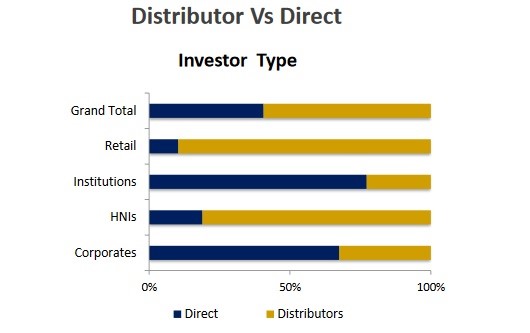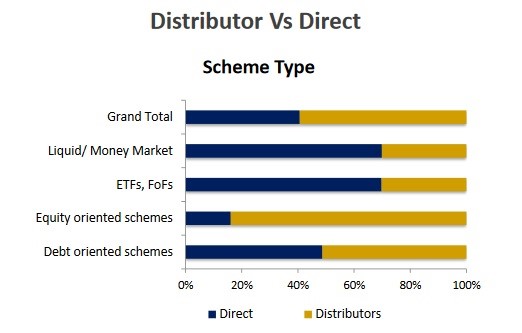Direct plans of mutual funds will take some time to gain momentum among retail investors. AMFI’s latest data shows that 90% of retail AUM was in regular plans of mutual funds as on June 2018.
Surprisingly, a major portion of HNI AUM, who generally prefer going direct, have invested in mutual funds through regular plans. AMFI data shows that 81% of HNI assets were in regular plans of mutual funds. HNIs are investors who invest with a ticket size of Rs.5 lakh or above.
A Balasubramanian, Chairman, AMFI and CEO, Aditya Birla Sun Life Mutual Fund believes that online distribution channel has contributed to the growth of regular plans. “A few investors who understand mutual funds invest through direct plans while most investors prefer investing through distributors who use technology. Today investors want to execute transaction and monitor their portfolio at a click of button and hence they prefer distributors who use technology. Also, distributors add a lot of value to clients by offering variety of services such as tax planning and estate planning.”
Sunil Subramaniam, MD, Sundaram Mutual Fund believes retail investors prefer handholding by advisors to invest in mutual funds. He said, “Considering the volatile nature of equity investments, many investors prefer advisors to direct investing. There are 2000 odd schemes and investors want handholding of distributors to choose best schemes to achieve their financial gaols based on their risk appetite.”
Another reason could be trust factor. Ajit Menon, DHFL Pramerica, believes that many investors in mutual funds have come through referrals. “In my view, many investors approach distributors through referrals. Hence, there is an element of trust. People like to work with someone they trust. Also, mutual fund investment requires a lot of logistic and administration support such as KYC, nomination, FATCA and so on, which investors cannot do on their own.”
Menon further said, “At times, even if an investor decides to go direct, he would eventually come to distributors as they adds value through their services. Even today, many distributors offer products such as PPF and post office savings just to service their customers. This cannot happen in direct route.”
In fact, a Foundation of Independent Financial Advisors (FIFA) and Final Mile study found that direct plan investors eventually come back to their advisors once they encounter complexities in mutual fund investments. The study said distributors need not panic if the customer opts for the direct option; while experiencing the inevitable difficulty in choosing mutual funds and performing transactions the customer is likely to return. “When customers evaluate the ‘sticker shock’ in the context of investment decision-making, they are more likely to stick with the advisor,” the study said.
In percentage terms, 10% of retail assets and 19% of HNIs assets were in direct plans of mutual funds as on June 2018.

The AMFI data also gives a break-up of the AUM under regular and direct plans in various schemes. It showed that regular plans are most preferred for investing in equity-oriented schemes. Nearly 84% of AUM in equity-oriented schemes came from distributors. Equity-oriented schemes include equity and balanced funds.
However, this data includes individual and institutional investments in equity-oriented schemes. If we take the assets under individual investors, 92% of the individual AUM was under a regular plan.
“The proportion of direct investments in equity, to the total assets held by individual investors, was about 8% in June 2018,” says AMFI. Individual investors include retail and HNIs.
Among other categories of schemes, debt-oriented schemes also had a higher AUM under regular plans. Distributors managed 51% of the AUM of debt-oriented funds.








